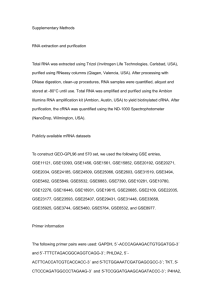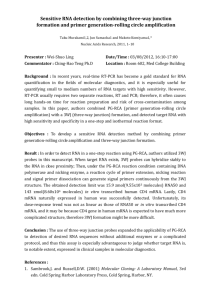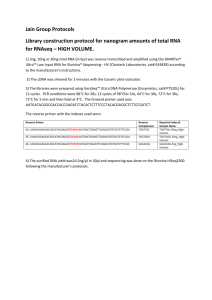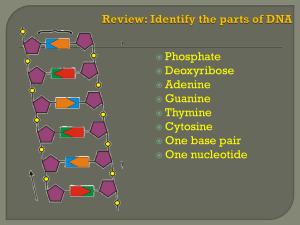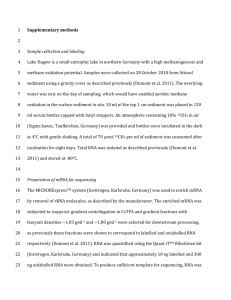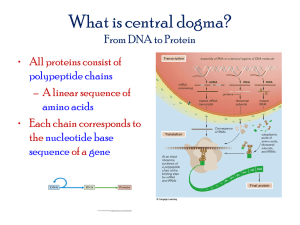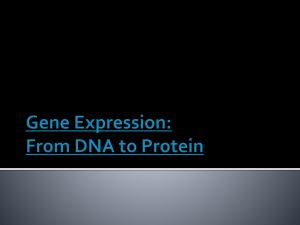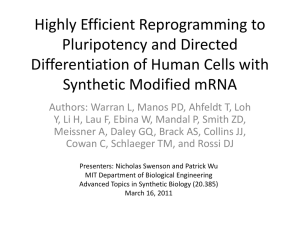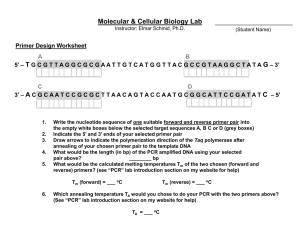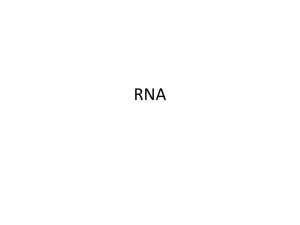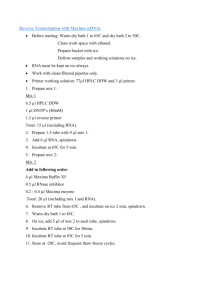Supplementary Material
advertisement
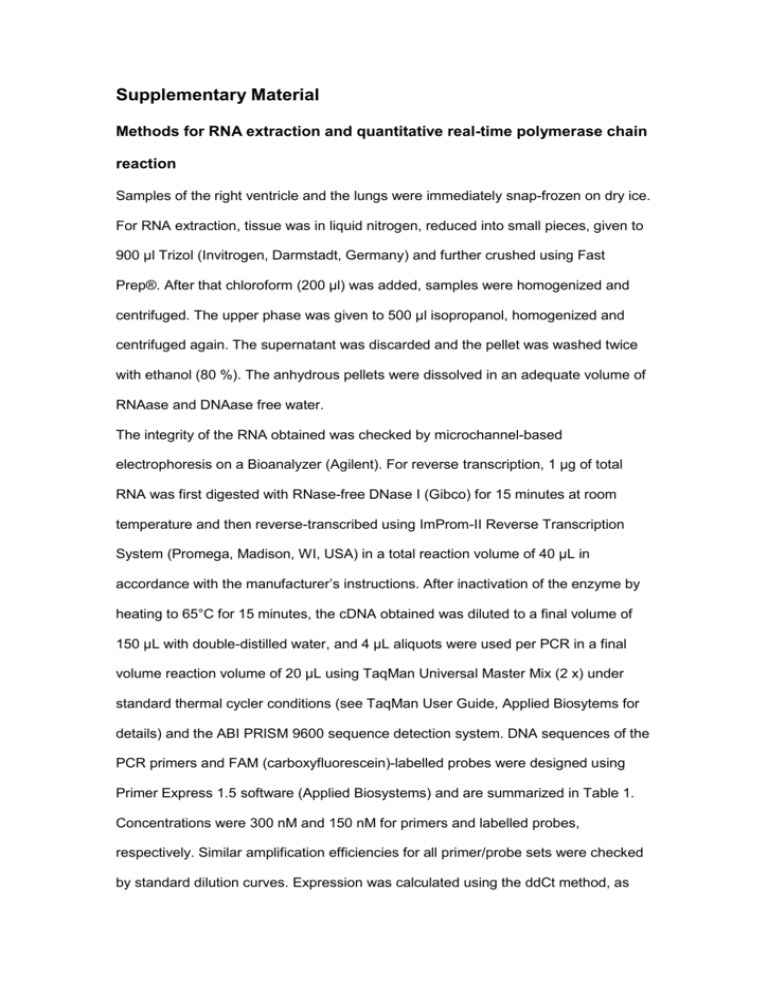
Supplementary Material Methods for RNA extraction and quantitative real-time polymerase chain reaction Samples of the right ventricle and the lungs were immediately snap-frozen on dry ice. For RNA extraction, tissue was in liquid nitrogen, reduced into small pieces, given to 900 µl Trizol (Invitrogen, Darmstadt, Germany) and further crushed using Fast Prep®. After that chloroform (200 µl) was added, samples were homogenized and centrifuged. The upper phase was given to 500 µl isopropanol, homogenized and centrifuged again. The supernatant was discarded and the pellet was washed twice with ethanol (80 %). The anhydrous pellets were dissolved in an adequate volume of RNAase and DNAase free water. The integrity of the RNA obtained was checked by microchannel-based electrophoresis on a Bioanalyzer (Agilent). For reverse transcription, 1 μg of total RNA was first digested with RNase-free DNase I (Gibco) for 15 minutes at room temperature and then reverse-transcribed using ImProm-II Reverse Transcription System (Promega, Madison, WI, USA) in a total reaction volume of 40 μL in accordance with the manufacturer’s instructions. After inactivation of the enzyme by heating to 65°C for 15 minutes, the cDNA obtained was diluted to a final volume of 150 μL with double-distilled water, and 4 μL aliquots were used per PCR in a final volume reaction volume of 20 μL using TaqMan Universal Master Mix (2 x) under standard thermal cycler conditions (see TaqMan User Guide, Applied Biosytems for details) and the ABI PRISM 9600 sequence detection system. DNA sequences of the PCR primers and FAM (carboxyfluorescein)-labelled probes were designed using Primer Express 1.5 software (Applied Biosystems) and are summarized in Table 1. Concentrations were 300 nM and 150 nM for primers and labelled probes, respectively. Similar amplification efficiencies for all primer/probe sets were checked by standard dilution curves. Expression was calculated using the ddCt method, as described by Livak and Schmittgen,1 with the exception that the normalized expression level of each mRNA was calculated individually using the formula: Expression = 2(15–dCt), where dCt is the difference in cycle threshold (Ct) value between the gene of interest and the reference gene.2 This method allows the calculation of a standard deviation for the control samples instead of defining expression levels to be equal to 1. Furthermore, the absolute expression level given in arbitrary units between different transcripts can be compared directly if the same formula is used for the calculation. Ct values were corrected for the expression levels of ribosomal protein L32, β-2 microglobulin and β- actin mRNA levels to exclude different starting amounts of total RNA. We observed that the calculated expression level was independent of the housekeeping gene used, indicating that the mRNA expression level of ribosomal protein L32, β-2 microglobulin and β-actin was not different between the different right ventricle myocardial samples. Therefore, we decided to normalize all mRNA expression data to that of ribosomal protein L32. The resulting expression level shows the mean of three independent experiments ± standard deviation (SD) and is given in arbitrary units. Supplemental Table 1: Primer and probe sequences for real-time PCR analysis of rat atrial natriuretic peptide (ANP), rat brain natriuretic peptide (BNP), rat procollagen-I-alpha-2 (COL1A2), connective tissue growth factor (CTGF), rat tissue inhibitor of metalloproteinase 1 (TIMP1) and rat fibronectin. Symbol Forward primer (5'–3') Reverse primer (5'–3') Probe (5'-FAM–3'-TAMRA) Atrial natriuretic peptide ANP CCTCTTCCTGGCCTTTTGG TGTGTTGGACACCGCACTGT TCCCAGGCCATATTGGAGCAAATCC Brain natriuretic peptide BNP GCTGCAGACTCCGGCTTCT ATCACTTGAGAGGTGGTCCCA ACTCTGCCTGCGGCTCTTCTTTCCC Collagen, type I, alpha-2 COL1A2 CCCAGCCAAGAATGCATACA TCAAACTGGCTGCCACCAT TGCCCAGGCCAACAAGCATGTCT Tissue inhibitor of TIMP1 CCGCAGCGAGGAGTTTCTC GGCAGTGATGTGCAAATTTCC TCGCGGGCCGTTTAAGGAA B2M GCTCGCTCGGTGACCG GTTTTCTGAATGGCAAGCACG TTTCTGGTGCTTGTCTCTCTGGCCG metalloproteinase 1 β-2 microglobulin Coagulation Factor II ACGAGATACAGCCCAGCGTC CCTTGCACACTGGTCGCTC TGCAGGTGGTGAACCTGCCCATT CCACCTTTCTCGGCTTCCTT TCCTTCAGGTGGCCGTTGGTGC (Prothrombin) Tissue factor (Factor III) TF CTTTCCCTGGAGGAGTGCC FAM, carboxyfluorescein; TAMRA, carboxytetramethylrhodamine. Supplemental Figure 1: Treatment with rivaroxaban starting 4 hours before MCT injection and continued for 4 days does not inhibit development of RV hypertrophy (daily dose 10–30 mg/kg). Data are mean ± SEM (n = 9–10 per group). RV, right ventricular; MCT, monocrotaline. References 1. Livak KJ, Schmittgen TD. Analysis of relative gene expression data using realtime quantitative PCR and the 2(-Delta Delta C(T)) Method. Methods 2001;25:402-408. 2. Ellinghaus P, Scheubel RJ, Dobrev D, Ravens U, Holtz J, Huetter J et al. Comparing the global mRNA expression profile of human atrial and ventricular myocardium with high-density oligonucleotide arrays. J Thorac Cardiovasc Surg 2005;129:1383-1390.
